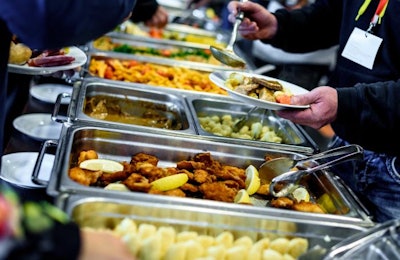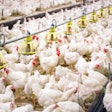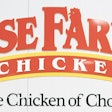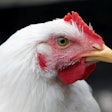
Editor’s note: In addition to publishing its regular news coverage of broiler welfare issues and the movement toward slower-growing broilers, WATT Global Media will be publishing a special series on these topics. This is the first installment of the series.
When it comes to major companies that have adopted what are often referred to as animal welfare programs for their broiler supplies, it is the foodservice industry that has been the first to make commitments.
The poultry welfare programs typically adopted involve a 100 percent transition to broilers that are certain breeds — normally a slower-growing breed — that are approved by either the Global Animal Partnership (GAP) or Royal Society for the Prevention of Cruelty to Animals (RSPCA).
In those pledges, companies have vowed to source only chicken from suppliers who:
- Reduce stocking density to a maximum of six pounds per square foot
- Provide birds with enriched environments
- Process chickens in a manner that avoids prestun handling and instead use controlled atmosphere stunning
The first company to make such a broiler welfare commitment was grocer Whole Foods Market, which adopted the policy in March 2016.
After that, the next five companies to do so were North American foodservice companies. Aramark and Compass Group both signed pledges in November 2016, followed by December pledges from Sodexo, Delaware North and Centerplate.
Why are foodservice companies the first to commit?
Animal rights groups such as the Humane Society of the United States (HSUS), Compassion in World Farming, Compassion Over Killing, Mercy for Animals, American Society for the Prevention of Cruelty to Animals, The Humane League, Animal Equality and World Animal Protection, have been actively campaigning to get brands to sign commitments.
In fact, HSUS has been tracking those promises and has created an online list of welfare commitments.
Since those initial five foodservice providers have made pledges, others have followed suit. So far in 2017, fellow foodservice companies Guest Services, Creative Dining Services, Unidine, Spectra, Southern Foodservice, Genuine Foods, Whitsons Culinary Group, Metz Culinary Group, Epicurean Feast, Opaa! Food Management and Guckenheimer Enterprises have signed broiler welfare pledges. All companies are vowing to complete the transition by 2024.
Hannah Thompson Weeman, vice president of communications for the Animal Agriculture Alliance, says those organizations have been investing a lot of resources into convincing companies to adopt such policies. She believes so many foodservice companies have adopted those policies because of campaigns from animal rights groups, and that gearing that campaign toward foodservice providers is a “very strategic” move.
“There are fewer foodservice companies. They are bigger but they’re fewer, so they were probably better able to concentrate their pressure,” she said. “As soon as they get the big, major players to make those pledges, all of the competitors are going to very quickly go down the same path, because they don’t want to be seen as behind on this issue.”
She added that many of those foodservice companies are prevalent on college campuses, and proponents of such welfare policies will go to campuses to drum up support from students.
However, Josh Balk, vice president, farm animal protection, HSUS, downplays the notion that companies are making these commitments as a result of activist campaigns.
“I think it’s more to do with the foodservice industry collectively being on the forefront of issues of animal welfare, more so than us focusing on a particular sector,” Balk said.
“(Foodservice providers) operate on a variety of accounts, so they have to be sensitive to consumer concerns. The foodservice industry, like Compass Group, Aramark and Sodexo, they run the dining operations everywhere from colleges and universities, to hospitals, to prisons, to baseball stadiums to myriad other locations. When you have such a variety, you have to be on the forefront of issues that matter to consumers. That is how they keep in business.”
According to Balk, foodservice operators were also among the first companies to commit to cage-free eggs and gestation crate-free pork. It is a “very natural pattern within the food industry on addressing these issues,” he adds.
Restaurant industry commitments
Up to this point, a comparable, if not larger, number of restaurant chains have made broiler welfare commitments, though Thompson-Weeman pointed out that there are many more restaurant chains in operation than foodservice providers.
Many of the early commitments were made by companies such as Panera Bread and Starbucks, which do not source a large amount of chicken when compared to others. One of the most recent commitments was made by Focus Brands, which operates Mae’s Southwest Grill, Schlotzsky’s, Carvel, Auntie Annes’ and Cinnabon. However, Auntie Anne’s specializes in pretzels and Cinnabon specializes in cinnamon rolls and other baked goods, so those commitments will leave little impact on the broiler industry.
Perhaps the two biggest purchasers of chicken to make commitments are sandwich chain Subway and Restaurant Brands International (RBI), which is the parent company of Tim Hortons, Burger King and Popeyes. However, RBI made its commitment prior to the completion of the Popeyes acquisition, and has not yet given a clear timeline for when the Popeyes transition would be completed.
Balk believes the list of restaurant brands to commit to broiler welfare policies will rapidly grow.
“I think if we follow down this natural pattern, we’re going to see pretty much everyone announce a policy over the next 12 months,” he said.
He does not believe that a 12-month timeframe is ambitious. Instead he views it as pessimistic, and said he would rather be conservative in making such a projection and then surprise everyone concerning how soon the commitments are made.
Poultry industry stance on broiler welfare commitments
While the animal rights groups that are promoting the shift are often seen as adversaries to industry groups such as the Animal Agriculture Alliance or the National Chicken Council (NCC), spokespeople for both organizations say they are not necessarily against the standards of production and processing as called for in these policies.
But neither are for a 100-percent transition which are part of the commitments to come from those foodservice providers and restaurant chains.
“We aren’t really for or against any type of production methods. Obviously, our focus is on making sure the animals receive the highest level of welfare and care,” Thompson-Weeman said, adding that the organization supports fact-based research into different production methods and addressing any potential problems with those production methods.
“Our platform is about choice. Producers should be able to choose what types of production work best for their families and their farms and their operations, and where they are located. Consumers should be able to have choices at the grocery store so they can select products that match their values and budget. We are not opposed to any advanced welfare.”
Tom Super, senior vice president of communications for the NCC, said similar things concerning his organization’s views.
NCC is not opposed to the use of slower-growing broiler breeds or enhancements for the chickens, but does not favor a complete transition.
“What we are against is fear mongering, animal rights activist groups seeking to drive their agenda to our consumer groups, and we’re against limiting consumer choice and making chicken less affordable,” Super said.
“To go 100-percent slow-growth is not good for the supply chain. It’s naïve and it’s not good for sustainability.”
















